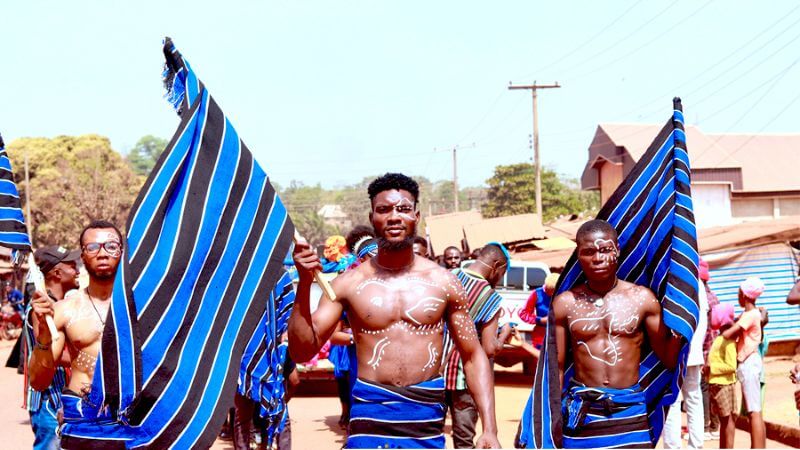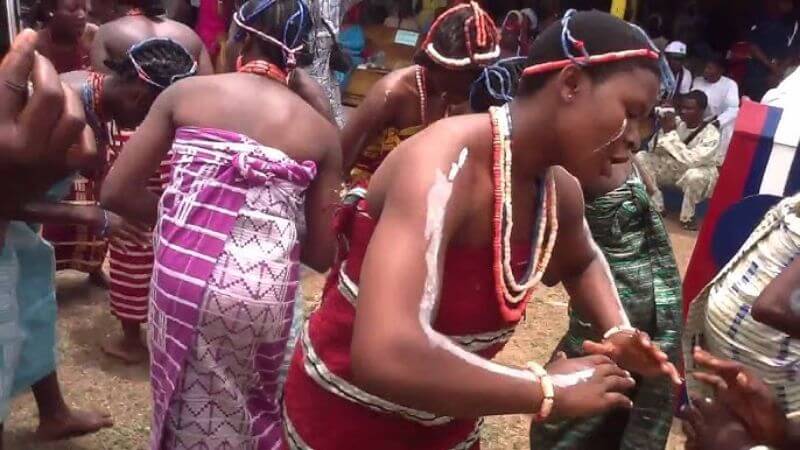Nigeria, the “Giant of Africa,” is home to one of Africa’s best cultural heritage, shaped by over 250 ethnic groups and more than 500 unique languages. This diverse heritage has created a unique national identity that consists of traditional practices with modern influences. From colorful attire and mouthwatering cuisine to world-renowned entertainment and artistic expressions, Nigerian culture & traditions continue to make their mark globally while maintaining strong ties to its rich history.
This blog post aims to highlight the beauty of the Nigerian culture and traditions, and how they can all be traced back from the diverse ethnic groups in the country – while also emphasizing the shared elements that create national unity.
Nigeria’s Cultural Diversity
The Nigeria’s cultural identity is primarily dominated by three major ethnic groups:
- Hausa-Fulani: Predominant in northern Nigeria and largely Muslim
- Igbo: Predominant in southeastern Nigeria and largely Christian
- Yoruba: Predominant in southwestern Nigeria with a balance between Muslim and Christian followers
Other significant groups include the Edo people (between Yorubaland and Igboland), the Ibibio/Annang/Efik/Tiv people of coastal southeastern Nigeria, and the Ijaw of the Niger Delta. Beyond these larger groups, there are hundreds of “minority” ethnic groups spread throughout the country, particularly in the middle belt and northern regions.
This ethnic diversity translates into approximately 350 linguistic groups, each with its different cultural practices, traditions, and belief systems, creating a unique and fascinating blend of culture.
Unity in Diversity: Shared Traditions
Despite many visible differences, Nigerians at large still share common ties. This includes: Inter-ethnic marriages, commerce, and festivals like weddings or harvest celebrations, etc. For instance, the “Agbada” (a flowing robe) and “Gele” (headwrap), once regional attire, are now worn nationwide.
Similarly, Nollywood films and Afrobeat music resonate across ethnic lines, proving that shared culture transcends boundaries, and creates what Nigerians now proudly call “Unity in Diversity.” So, let’s look at two popular ways in which Nigerians have been largely united, even amidst many cultural differences:
Traditional Attire & Fashion
Nigerian traditional clothing is as diverse as its ethnic groups, with each region having unique clothing styles that reflect their local identity and heritage:
- Igbo men from the southeast are known for their red caps
- Niger Delta men traditionally wear distinctive hats
- Tiv people of Benue State wear “Ange” cloth with zebra-like black and white stripes
- Idoma people wear similar clothing with red and black stripes
- Northern Nigerian men (predominantly Hausa/Fulani) wear “Baban riga” (or “Agbada”), “Buba,” and “Shokoto” with matching caps, or “Kaftans”
- Yoruba men wear their own regional variation of the “Agbada,” “Buba,” and “Shokoto” ensemble.
But regardless of these regional attires, many Nigerians now wear fashions from other regions that appeal to them. The “resource control” attire, initially associated with the Niger Delta region, has become popular throughout the country. Many women across Nigeria often wear “Buba,” “Iro,” “Gele,” and “Ipele” with regional style variations.
Traditional hand-woven fabrics like “Akwete,” “Aso-Oke,” “Batik,” and “Tie and Dye” are prized in the textile industry, while “Ankara” materials have become a fashion statement both domestically and internationally.
Languages & Communication
In Nigeria, language is another touch-point that unifies different cultural groups. While each ethnic group maintains its native tongue, English serves as Nigeria’s official language.
Also, Nigerian Pidgin English has evolved from being associated primarily with those who couldn’t speak formal English to becoming a lingua franca used by Nigerians across all social classes and education levels.
This flexibility in language can be seen in popular phrases like “How you dey” (instead of “How are you”), which have become part of Nigeria’s cultural fabric.
Nigerian Arts & Crafts
Literary Arts & Famous Writers
Nigeria’s literary scene is world-renowned. Since independence in 1960, Nigeria’s literary arts have flourished with increased documentation of folklore and traditions – with globally acclaimed literary figures who serve as “cultural engineers” for society.
Here are some notable Nigerian authors:
- Wole Soyinka: The first Black writer to win the Nobel Prize for Literature (1986)
- Chinua Achebe: Author of the classic novel “Things Fall Apart”
- Other prominent writers: Cyprian Ekwensi, John Pepper Clark, Gabriel Okara, Abubakar Imam, Flora Nwapa, Zulu Sofola, Amos Tutuola, Chukwemeka Ike, Elechi Amadi, and Chimamanda Adichie.
These literary icons have created a substantial reservoir of material that inspires Nigeria’s film industry and helps preserve cultural narratives.
Traditional Arts & Crafts
Nigerian craftspeople have practiced their trades for over two thousand years, producing high-quality works that evidence early civilization:
- Terra-cotta and iron smelting from Nok culture
- Bronze works from Ife and Benin
- Metalwork from Igbo-ukwu
These artistic traditions received patronage from royal courts and wealthy homes, encouraging the production of ceremonial items like state swords, scepters, royal drums, ivory ornaments, beaded handles, crowns, and various royal regalia.
Calabash carving represents another prominent craft with a long tradition in Nigeria. Communities in Old Oyo, Plateau, Bauchi, Sokoto, Adamawa, and Bornu states are known for producing intricately designed calabashes that are widely used and marketed across Nigeria and other African countries.
Contemporary Painting & Sculpture
Modern Nigerian art is built upon the creative foundations established by early civilizations like Nok, Ife, Benin, and Igbo-Ukwu. Since independence, Nigeria has produced five generations of modern artists, starting with pioneers like Aina Onabolu and continuing with contemporary talents such as Samuel Onyilo and Paul Oluwole.
Nigerian painters work with diverse techniques including watercolors, acrylics, wood burning, and mixed media. Nigerian sculptors create outstanding works using wood, iron, bronze, and stone. Their creations are displayed in major galleries and private collections worldwide, with commissioned pieces adorning roundabouts in major cities across the country.
Nigerian Cuisine & Gastronomy
Over the years, Food has become one of Nigeria’s cultural attractions. Popular foods like Jollof Rice, Egusi Soup, and Suya (spiced grilled meat) are now like National treasures. The Nigerian culinary practices are as diverse as the country’s ethnic groups, with each region cherishing its distinctive cuisine.
Here are some of the major traditional dishes and delicacies that have become part of the national heritage include:
- Edikaikon
- Okoho
- Fufu, Tuwo, Akpu (various forms of starchy sides)
- Suya, Kilishi (spiced meat)
- Gbegeri, Owo
- Bush meat
- Fura de nunu, Kunu (traditional drinks)
- Amala, Eba, Pounded yam (starchy sides)
Popular snacks include Akara, Boli (roasted plantain), and various preparations of corn (boiled, popped, or roasted). Nigerian hospitality is known for feeding guests generously, an important cultural value.
Traditional Music & Cultural dance
Music as an art has been one of Nigeria’s oldest cultural identifiers, with different regions and communities having their unique music and dance styles for specific occasions:
- Idoma people (Benue state): Ajah, Oghrinye, Odumu, and Ichicha
- Tiv people: Swange and Kwagh-hir
- Southeast region: Ogene, Atilogwu, and Nkpokiti
- Southwest region: Sakara, Bata, Sato, Ponse, Yemoja, Gelede
- Northeast and northwest regions: Chalawa, Dabe, Goje
- Edo State (south-south region): Igbabo
These traditional forms have influenced the development of modern Nigerian music, which has gained international recognition.
The Nigerian Entertainment Industry
The Nigerian culture will not be complete without the fun noise coming from the entertainment industry. So, let’s take a look at some of the pillars of this industry and how they originated from the people’s way of life.
Nollywood: Nigeria’s Film Industry
Since the 1992 groundbreaking film “Living in Bondage” by Kenneth Nnebue, Nollywood has quickly become one of the world’s largest film industries, ranking behind only Hollywood and Bollywood.
Today, Nollywood and the Nigerian music industry constitute a major cultural and economic force, accounting for over 1.4% of Nigeria’s GDP in 2013, with continued growth.
Prominent Nollywood actors include Pete Edochie, Olu Jacobs, Nkem Owoh (Osuofia), Segun Arinze, Francis Duru, Chidi Ikedieze, Osita Iheme, Desmond Eliot, and Emeka Ike. Famous actresses include Patience Uzokwor, Rita Dominic, Genevieve Nnaji, Ini Edo, Omotala J. Ekeinde, Ngozi Ezeonu, Mercy Johnson, Stephanie Okereke Linus, Funke Akindele, Uche Jumbo, and Joke Silva.
Also, major production centers include Lagos, Onitsha, Enugu, Asaba, and Abuja.
Afrobeats: The Nigerian Music Industry
The Nigerian music industry continues to expand yearly, contributing billions of naira to the economy. Nigerian musicians blend hip-hop, rap, R&B, reggae, and gospel with traditional Nigerian beats and instruments – popularly called AfroBeats, which creates unique sounds that appeal to audiences worldwide.
Popular musicians include Burna Boy, Davido, Wizkid, Rema, Flavour, Phyno, Tiwa Savage, 2-Face Idibia, P-Square, Timaya, Olamide, D’Banj, Don Jazzy, and host of other well-known musicians. Gospel music also thrives with artists like Mercy Chinwo, Nathaniel Bassey, Frank Edward, Panam Percy Paul, Yinka Ayefele, Sinach, and many others.
Stand-Up Comedy & Skits
Stand-up comedians and skit makers have become an integral part of Nigeria’s entertainment industry, offering humor inspired by everyday Nigerian experiences. Popular comedians include AY, Basketmouth, Bovi, I go dye, Akpororo, Gordons, etc. Some popular skit makers include: Sabinus, Mr Macaroni, Brain Jotter, Broda Shaggi, etc.
Tourism & Cultural Heritage Sites
Nigeria is not just a multilingual and multi-ethnic nation. One of Nigeria’s unique cultural heritage is its diverse historical, ecological, and natural resources – which makes it one of the best tourist destinations in Africa.
With a landmass of about 932,768 km² and a population of over 177 million, Nigeria is home to many natural attractions which include:
- Warm, sunny climate
- Fascinating beaches
- Evergreen vegetation in the south
- Alluring landforms and savannah grasslands in the north
- Hill formations
- Waterfalls and springs
- Mountainous areas with temperate-like climates
- Unique wildlife species
These natural wonders, combined with Nigeria’s rich cultural heritage, provide numerous opportunities for tourism development.
Final Thoughts [Nigerian Culture & Traditions]
Nigerian cultural heritage is a living, evolving force – originating from hundreds of ethnic traditions, languages, and artistic expressions. From traditional dress and cuisine to modern film and music, Nigerian culture continues to evolve while maintaining connections to its historical roots.
The strength of Nigerian culture lies in its ability to embrace diversity while finding common ground – creating unity without uniformity. As Nigeria continues to share its cultural wealth with the world through literature, film, music, art, and fashion, it reinforces its position as not just a geographical giant of Africa, but a cultural powerhouse with global influence.
Whether experienced through the pages of a Chimamanda Adichie novel, the rhythm of Afrobeats music, the flavor of jollof rice, or the drama of a Nollywood film, Nigerian culture offers a rich, multifaceted experience that continues to captivate and inspire people around the world.
READ MORE…
Are you an expat, a first-time visitor to Nigeria, or just a travel enthusiast looking for a fun adventure? Check out this post on the 54 Best tourist attractions in Nigeria for adventure seekers



